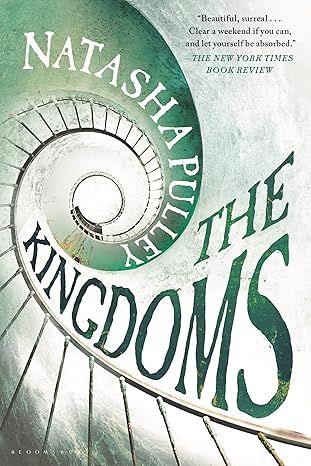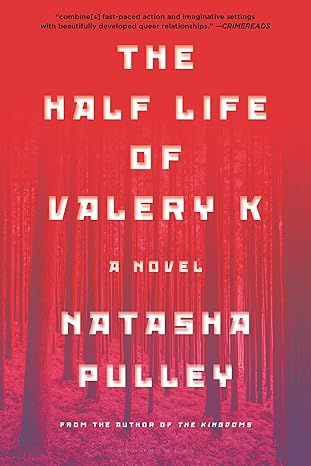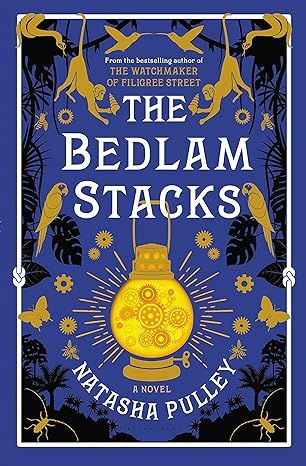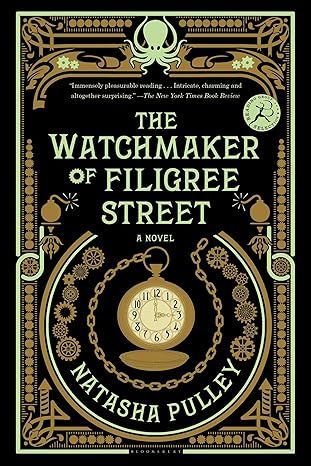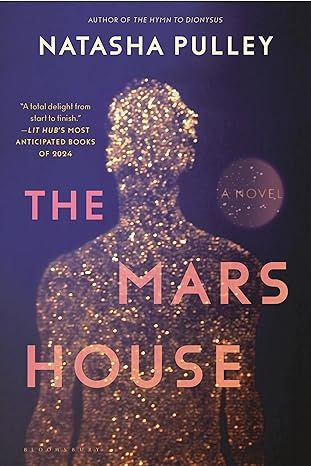The Kingdoms
4.2
-
1,363 ratings
For fans of The 7 ½ Deaths of Evelyn Hardcastle and David Mitchell, a genre bending, time twisting alternative history that asks whether it’s worth changing the past to save the future, even if it costs you everyone you’ve ever loved.
Joe Tournier has a bad case of amnesia. His first memory is of stepping off a train in the nineteenth-century French colony of England. The only clue Joe has about his identity is a century-old postcard of a Scottish lighthouse that arrives in London the same month he does. Written in illegal English―instead of French―the postcard is signed only with the letter “M,” but Joe is certain whoever wrote it knows him far better than he currently knows himself, and he’s determined to find the writer. The search for M, though, will drive Joe from French-ruled London to rebel-owned Scotland and finally onto the battle ships of a lost empire’s Royal Navy. Swept out to sea with a hardened British sea captain named Kite, who might know more about Joe’s past than he’s willing to let on, Joe will remake history, and himself.
From bestselling author Natasha Pulley, The Kingdoms is an epic, romantic, wildly original novel that bends genre as easily as it twists time.
Kindle
$9.99
Available instantly
Audiobook
$0.00
with membership trial
Hardcover
$20.92
Paperback
$10.99
Ships from
Amazon.com
Payment
Secure transaction
ISBN-10
163557952X
ISBN-13
978-1635579529
Print length
448 pages
Language
English
Publisher
Bloomsbury Publishing
Publication date
July 25, 2022
Dimensions
5.5 x 1.35 x 8.2 inches
Item weight
15.4 ounces
Product details
ASIN :
B08WLTHLSG
File size :
3170 KB
Text-to-speech :
Enabled
Screen reader :
Supported
Enhanced typesetting :
Enabled
X-Ray :
Enabled
Word wise :
Enabled
Editorial reviews
“Speculative fiction and historical fiction are closer cousins than one might think, and alternate-history novels can give enterprising writers the chance to work in both genres at once. Fans of such stories will be richly entertained by the lavish world-building and breakneck plotting of Natasha Pulley's The Kingdoms…Beautiful, surreal imagery appears throughout the novel, too...Clear a weekend if you can, and let yourself be absorbed.” ―The New York Times Book Review
“Natasha Pulley poses such a beguiling set of questions at the opening of The Kingdoms that even readers who are resistant to speculative fiction will barrel forward to discover the answers…The Kingdoms is interested not only in the adventure of its historical and imaginative plot, but also in what it would actually feel like to slip out of time…Thoughtful, inventive, and moody…an insightful meditation on how a sense of oneself can be lost – and found.” ―USA Today
“The Kingdoms contains multitudes: it is a love story, a seafaring war novel, a time-travel mystery, an alternative history tale, and more. And while each description in the previous sentence is accurate, each description fails to capture all that the book encompasses…the book is as much about trauma as it is about love, and Pulley doesn't flinch away from showing how the impacts of trauma reverberate throughout history.” ―Tor.com
“Pulley's prose feels ethereal even as it sizzles with dry humour. Pieces of the story take place at multiple places and times, and Pulley paints every single one of those settings with utmost veracity and vividness. Every single aspect of this book was indeed sheer perfection to me, but the romance at the core of the story-that blossomed even amidst all the uncertainty and carnage and hopelessness of war-really was the most beautiful thing about this book.” ―Nerd Daily
“Pulley's latest genre-bending feat (after The Lost Future of Pepperharrow) masterfully combines history, speculative fiction, queer romance, and more into an unputdownable whole. . . This is a stunner.” ―Publishers Weekly, starred review
“Natasha Pulley's The Kingdoms is an intricate plot, for sure, but you get swept up in the narrative. If this sounds like the type of book you're drawn to - epic! time travel! history! - you know who you are.” ―Alma
“As scenes spiral back and forth between centuries, the book's emotional center crystallizes around a fundamental mystery: Who, in fact, is Joe? All time-travel plots are fraught with paradox, but not all rise to Pulley's level of tricky cleverness, and few of those trickily clever books rise to her level of emotional intensity. Suspenseful, philosophical, and inventive, this sparkling novel explores the power of memory and love.” ―Kirkus Reviews, starred review
“Pulley balances the topsy-turvy nature of time travel by grounding her story in tidbits of naval history and a gradually unfolding queer love story.” ―BookPage
“This riveting story keeps the reader hoping that Joe can rebuild his family in the best time line.” ―Booklist
“I loved it.” ―Crimereads' Most Anticipated Books of Summer
“Pulley successfully tackles time travel with both humor and fine detail…Exploring time, chance, identity, love of all manners, loss and destiny, this is a novel in which to immerse yourself. At heart a love story, a sweeping and strange romance, it is also a grand adventure and a writerly feat of achievement.” ―Bookreporter
“Pulley, a Brit, has clearly done her homework. The research undergirding The Kingdoms is evident, as is her thrill at devising 'what if' scenarios to reimagine well-known periods in history. The descriptions of important events-which range from claustrophobic to expansive-are atmospheric and in tune with the location of the moment…The Kingdoms is a complicated tale with plenty of twists and turns that will keep readers enthralled all the way to the last pages.” ―Washington Independent Review of Books
Read more
Sample
Part I
LONDRES
1
Londres, 1898 (ninety-three years after Trafalgar)
Most people have trouble recalling their first memory, because they have to stretch for it, like trying to touch their toes; but Joe didn’t. This was because it was a memory formed a week after his forty-third birthday.
He stepped down off the train. That was it, the very first thing he remembered, but the second was something less straightforward. It was the slow, eerie feeling that everything was doing just what it should be, minding its own business, but that at the same time, it was all wrong.
It was early in the morning, and cursedly cold. Vapour hissed on the black engine right above him. Because the platform was only a couple of inches above the tracks, the double pistons of the wheels were level with his waist. He was so close he could hear the water boiling above the furnace. He stepped well away, feeling tight with the certainty it was about to lurch forward.
The train had just come in. The platform was full of people looking slow and stiff from the journey, all moving towards the concourse. The sweet carbon smell of coal smoke was everywhere. Because it was only just light outside, the round lamps of the station gave everything a pale glow, and cast long, hazy shadows; even the steam had a shadow, a shy devil trying to decide whether to be solid or not.
Joe had no idea what he was doing there.
He waited, because railway stations were internationally the same and they were a logical place to get confused, if there was ever a logical place. But nothing came. He couldn’t remember coming here, or going anywhere. He looked down at himself. With a writhe of horror, he found he couldn’t even remember getting dressed. His clothes were unfamiliar. A heavy coat lined with tartan. A plain waistcoat with interesting buttons, stamped with laurel patterns.
A sign on the wall said that this was platform three. Behind him on the train, a conductor was going along the carriages, saying the same thing again and again, quiet and respectful, because he was having to wake people up in first class.
‘Londres Gare du Roi, all change please, Londres Gare du Roi …’
Joe wondered why the hell the train company was giving London station names in French, and then wondered helplessly why he’d wondered. All the London station names were French. Everyone knew that.
Someone touched his arm and asked in English if he was all right. It made him jump so badly that he twanged the nerve in the back of his skull. White pain shot down his neck.
‘Sorry – could you tell me where we are?’ he asked, and heard how ridiculous it sounded.
The man didn’t seem to think it was extraordinary to find an amnesiac at a railway station. ‘London,’ he said. ‘The Gare du Roi.’
Joe wasn’t sure why he’d been hoping for something other than what he’d heard the conductor say. He swallowed and looked away. The steam was clearing. There were signs everywhere; for the Colonial Library, the Musée Britannique, the Métro. There was a board not far away that said the Desmoulins line was closed because of the drilling below, and beyond that, elaborate iron gates that led out into the fog. ‘Definitely … London in England?’ he asked eventually.
‘It is,’ the man said.
‘Oh,’ said Joe.
The train breathed steam again and made the man into a ghost. Through all the bubbling panic, Joe thought he must have been a doctor, because he still didn’t seem surprised. ‘What’s your name?’ the man asked. Either he had a young voice, or he looked older than he was.
‘Joe.’ He had to reach for it, but he did know; that was a thump of a relief. ‘Tournier.’
‘Do you know where you live?’
‘No,’ he said, feeling like he might collapse.
‘Let’s get you to a hospital then,’ the man said.
So the man paid for a cab. Joe expected him to leave it at that, but he came too and said there was no reason why not, since he wasn’t busy. A thousand times in the following months, Joe tried to remember what the man had looked like. He couldn’t, even though he spent the whole cab ride opposite him; all he remembered later was that the man had sat without leaning back, and that something about him seemed foreign, even though he spoke English in the hard straight way that old people did, the belligerent ones who’d always refused to learn French and scowled at you if you tried to call them monsieur.
It was maddening, that little but total failure of observation, because he took in everything else perfectly. The cab was a new one, all fresh leather and smelling of polish that was still waxy to touch. Later, he could even remember how steam had risen from the backs of the horses, and the creak of the wheel springs when they moved from the cobbles outside the station to the smoother-paved way down Rue Euston.
But not the man. It was as though the forgetfulness wasn’t so much an absence of memory, but a shroud that clung to him.
The road looked familiar and not. Whenever they came to a corner Joe thought he knew, there was a different shop there to the one he’d expected, or no building at all. Other cabs clopped past. Brown fog pawed at the shop windows. The sky was grey. In the background, he wondered if the man wasn’t being kind at all but taking advantage of things somehow, but he couldn’t think what for.
Not far away, monster towers pumped fumes into that gunmetal sky. They were spidered about with gantries and chutes, and in the flues, tiny flames burned. On the side of an enormous silo, he could just make out BLAST FURNACE 5 stamped in white letters in French. Joe swallowed. He knew exactly what they were – steelworks – but at the same time, they filled him with the dream-sense of wrongness that the Métro signs at the station had done. He shut his eyes and tried to chase down what he knew. Steelworks; yes, London was famous for that, that was what London was for. Seven blast furnaces up around Farringdon and Clerkenwell, hauling steel out to the whole Republic. If you bought a postcard of London, it always looked amazing, because of that towering tangle of pipework and coal chutes and chimneys in the middle of it. It was a square mile that had turned everything black with soot: the ruin of St Paul’s, the leaning old buildings round Chancery Lane, everything. That was why London was the Black City.
But all that might as well have come from an encyclopaedia. He didn’t know how he knew it. He didn’t remember walking in those black streets or around the steelworks, or any of it.
‘Did you get off the same train as me?’ he asked the man, hoping that if he focused on one particular thing, he might feel less sick.
‘Yes. It came from Glasgow. We were in the same carriage.’ The man had a clipped way of talking, but his whole body was full of compassion. He looked like he was stopping himself leaning forward and taking Joe’s hands. Joe was glad about that. He would have burst into tears.
He couldn’t remember being on the train. The man tried to tell him things that had been memorable, like the funny snootiness of the conductor and the way the fold-down beds tried to eat you if you didn’t push them down properly, but none of it was there. He confirmed that Joe hadn’t fallen or bumped anything, just started to look disorientated early this morning. It was nine o’clock now.
Joe had to let his head bow. He’d never been scared like it. He opened the window, just to inhale properly. Everything smelled of soot. That was familiar, at least. On the pavements, droves of men in black coats and black hats poured from the iron gates of the Métro stations. They all looked the same. The cab stopped for a minute or so, waiting at a railway crossing. The train was a coal cargo, chuntering towards the steelworks. The whistle howled as the driver tried to scare off some kids on the line; there were ten or twelve, foraging for the bits of coal that fell off the carriages.
‘You’ll be all right,’ the man said quietly. It was the last thing he said; while Joe was seeing the doctor, he vanished. None of the nurses had seen him go, or seen him at all, and Joe started to think he had got himself to the hospital alone, and that the man had been a benign hallucination.
There were two hospitals. The first was the Colonial Free, which was a dark, frozen place where all the windows stayed open to air the wards, and an exhausted doctor referred him, urgently, to an asylum over the river. Then there was another cab ride, by himself, paid for by the hospital. He curled up under his coat on the way, cold right to the marrow now. More of the black streets glided by, the terraces like widow’s lace. Then there was the Tamise: black too, and so packed with cargo ships that a limber person could have got across the whole breadth of it jumping from deck to deck. Normal, all normal. Except he felt like someone had left him on the surface of Mars.
The second hospital was called La Nouvelle Salpêtrière. It was a much nicer place than Joe had expected. South of the river, in Southwark, it was an impressive building that looked much more like a museum or a bank than a hospital. He had imagined it would be grim and white inside, but in fact it was hard to tell that it was an asylum at all. The entrance hall was all marble and pillars, nice couches, and chandeliers of electric lights. Someone deep in the building was playing the piano.
On the way upstairs to the consultant’s office, the nurse took him past two cells lined with cork, but the doors were open and nobody was inside. There was, said the nurse, a criminal wing, where the cases were far more serious, but it was separate. The only other sign that perhaps not everyone was to be trusted was the cages around the fireplaces.
While he was waiting outside the consultant’s office, a man lent him a copy of Le Monde and claimed to control the weather. Joe sat holding the paper, looking at the words and the typeface, and trying to trace why it was all wrong. It didn’t say anything extraordinary. There was the weather in one column – it didn’t match what the man predicted – an advert for silk shirts, one for a M. d’Leuve’s brand-new invention, an electric corset which was apparently very good for feminine discomforts. He wondered at that, because Madeline had never seemed so uncomfortable that she would need electrifying. He frowned at his knees when he realised he had remembered a name, and her face; a small woman with dark hair, who suited dark green. He couldn’t think of a last name, or if she was a sister or a wife, or neither.
The doctor’s office was airy, with a bleak, beautiful view over the hospital’s frosty lawns. On the wall was a certificate from an academy in Paris. The desk had bite marks on one leg, near the top. Joe looked round for the dog that must have done that but couldn’t see one, which was a lot more disconcerting than it should have been. All the details landed in his mind like bright pins, sharp and pricking and very unpleasant.
The doctor explained that he would be there for a week, on the understanding that the accommodation fees would be waived. ‘Now, you’ve been referred from the Colonial Free, I see. I can tell you now exactly what you’re suffering from. It’s a seizure; a form of epilepsy. With any luck, it will go off soon.’
‘A seizure?’
The doctor set the notes down and smiled. He was young and smartly turned out, Parisian; on colonial placement, probably, to rack up experience before returning to France. Joe felt hopeless. The more he thought about it, the more he realised he knew general things, but nothing specific.
‘Yes,’ the doctor said. ‘I’m personally very interested in this particular epilepsy type, so I’ve been asking for cases, hence your referral. It’s what we’re calling silent epilepsy; it doesn’t come with convulsions, only the symptoms we would usually associate with an epileptic aura – amnesia, paramnesia, visions. Had anything of the latter two?’
‘What does paramnesia mean?’ Joe asked. The doctor’s voice was so posh that he could feel himself furling up inside with the urge to keep his answers short, and not to ask questions or to waste time.
‘The blurring of something imaginary and something real. Most commonly, déjà vu; the sense you’ve seen something new before. And its opposite, jamais vu, which is when something that should be familiar feels wholly alien.’
‘Yes!’ Joe said fast, and felt his eyes burn, desperately grateful to hear someone name the feeling. ‘Yes, that second one, ever since that man found me at the station! I didn’t think the Gare du Roi was in London, all the streets looked wrong, the – newspapers look wrong …’
‘Textbook,’ the doctor said gently. ‘Absolutely. Now, I can promise you that you do know Londres, because you’ve got a very strong Clerkenwell accent.’ He smiled again. ‘Let’s see what happens if we keep you here in the quiet for a few days. I’m putting you down as a curable,’ he added, motioning at the form in front of him.
‘What if it doesn’t go away?’ Joe said. He was having to speak carefully. It felt like he hadn’t spoken for a long, long time, which was absurd, because he had spoken before, at the other hospital, and the train station. But the order of words felt wrong. French, they were speaking French of course, and the man at the station had spoken English; maybe it was just the switchover.
‘Well, let’s talk about that in the—’
‘No, let’s talk about it now, please.’
‘There’s no need to be aggressive,’ the doctor said, sharp. He drew back in his chair a few inches, as though he thought Joe might punch him.
Joe frowned. ‘I’m not being aggressive, I’m really scared.’
The honesty seemed to take the doctor by surprise. He had the grace to look awkward. ‘You understand my caution. Your notes say you arrived at the Colonial Free speaking English, and that coat you’re wearing now has a tartan lining. The train you were on came from Glasgow.’ His tone turned from questioning to accusatory by the end.
‘Sorry?’ said Joe, lost.
‘If I say the Saints to you, does that ring a bell?’
Joe searched for it, but got nothing. ‘Is that a church?’
‘No, it’s a terrorist group that makes a habit of bombing trains and random sections of the Republic.’
‘Oh. And they …’
‘Speak English and wear tartan and occupy Edinburgh, which does not have a railway connection, for obvious reasons, to Londres. They use Glasgow.’
Joe stared down at the lining of his coat sleeve. ‘I … can’t see myself bombing anything. I think I’d go to pieces under pressure. I am going to pieces. Have … gone.’
The doctor must have thought so too, because he relented. ‘If it doesn’t go away, it means that there may be a lesion or a tumour pressing on part of your brain, in which case, there’s very little we can do, and it will probably prove fatal eventually.’ He said it bluntly, punishment for Joe’s having scared him before. ‘Meanwhile, we’re putting your details and description in the papers. See if we can find you some relatives.’
Joe knew he should say thank you, but it was an uphill struggle to say anything now. ‘And if no one comes?’
‘The county asylum is free, so you could go there.’ The doctor winced at the idea, and Joe tried not to imagine what the county asylum was like. ‘But as I say, we’re putting you up for the week, so we have until next Tuesday.’
‘Right.’
A huge dog padded in and put its head on Joe’s lap, and looked at him hopefully until he stroked its ears. It was a relief to see that there really was a dog, and that it wasn’t a patient who’d gnawed on the table leg.
‘Don’t mind Napoleon, he’s very friendly. However,’ the doctor continued, as if he hadn’t mentioned the dog, ‘I’ve never seen a case that hasn’t cleared in a few days, if not a few hours. And it’s an incredibly common condition. We had a rush of people with it a couple of months ago and they all recovered perfectly. Not so bad as this, but precisely the same thing.’
Joe looked up from the dog. ‘A group of people with the same thing in the same timeframe implies an external cause that affects all of them. Doesn’t it?’
The doctor widened his eyes, then laughed, as if it was surprising that Joe would know words like implies and external. ‘Well, yes. A cluster does imply an external cause. But there is no geographical cluster. Patients from right across the Republic have experienced it, from Rome to Dublin. We’re looking into all sorts: weather, water tables, crops, air miasma. But don’t worry yourself. We’ll work it out.’
Joe nodded.
‘Settle down, have a game of tennis with someone. Plenty of veterans here, wonderful fellows, they just don’t get on so well with sudden noises. I’ll see you in a few days.’
Joe wanted to ask more, but that was that, because a woman drifted in holding a doll too tightly and pointed at the dog, and the doctor hurried up to ease her away again. The dog followed them.
Read more
About the authors
Natasha Pulley
Natasha Pulley was born in Cambridge. She read English Literature at Oxford before doing an MA in Creative Writing at the University of East Anglia. In 2013 she went to Japan on a scholarship from the Daiwa Anglo Japanese Foundation. She lived in Tokyo for a year and a half, learning Japanese and researching her first book, 'The Watchmaker of Filigree Street'. She spent several months in Peru courtesy of a travel grant from the Society of Authors, chasing llamas and researching 'The Bedlam Stacks', and more recently, spent some time in Shanghai studying Mandarin for 'The Mars House'. She lives in Bristol.
Read more
Reviews
Customer reviews
4.2 out of 5
1,363 global ratings
Shaylin
5
Painfully beautiful
Reviewed in the United States on December 29, 2022
Verified Purchase
I can only describe this book as painfully, tragically beautiful. Is it possible to give it 6 stars out of 5? Or 10? I’m just gonna go with yes and do that. So 6 + 10 = 16 stars out of 5. Fight me.
I finished this in the early hours of the morning and well into the evening now can still feel the ghosts of those words underneath my skin. Other reviewers have captured the magic of this book better than I will ever be able to, but suffice to say that the top comments on goodreads are well-deserved and in no way embellished. First off, I’m in awe of how this book was put together. The interlocking and fluidly changing timelines are woven with such deft finesse that I had to put down the book multiple times and just stare at the wall for a minute while acknowledging that some amazing human out there has a brain that can come up with something like this out of thin air. Blown. Away. But beneath the richly realized historical setting, brilliantly intelligent time-shifting structure, and slowly flowering puzzlebox nature of this book lies the true engine: the characters. THE CHARACTERS. Rarely do I close a book feeling like I’ve been granted the privilege of seeing someone’s soul, but I absolutely did with this one. Missouri Kite was everything. It was impossible not to want so much for someone who wanted so little for himself. He was the beating heart of this book and I would’ve happily read about him until the end of time.
This book was poignant and moving. It snuck up on me. It crushed my heart to fine powder and then somehow reassembled it. I’m forever a fan of Natasha Pulley, all hail the queen.
Read more
4 people found this helpful
M. A. Wolfson
5
Complex and Complelling
Reviewed in the United States on April 30, 2024
Verified Purchase
After reading all of Natasha Pulley’s other wonderful novels, Kingdoms is a delight. It’s not as perfect as The Watchmaker of Filigree lane, but it brings with it complex characters who lodge themselves into your heart.
ancientreader
5
Riveting. That is all.
Reviewed in the United States on December 18, 2021
Verified Purchase
From the moment I started the sample, I couldn't stop reading. I was caught up in the suspense of the alternative-history plot (will the British be able to re-create a world in which they won the Battle of Trafalgar?) & in the central human mystery of who Joe is / who he is to Kite / whether Joe will be able to return to his daughter. You'll probably figure out the answers to the Joe questions long before Joe does, but it makes human sense that he doesn't get there till very late, and IMO the fact that he doesn't makes the uncertainty all the more poignant.
Pulley's worldbuilding is superbly detailed. A great deal is implied rather than stated directly on the page, & I can well imagine that if you're not paying careful attention you might become confused. I sometimes tend to skim, but I wanted to bathe in Pulley's prose, it's so beautiful and insightful; I wound up rereading long passages because I wanted to fix them in my memory. (Well, how else are you going to respond to a book with memory and forgetting as central themes?) Incidentally, there is no version of Britain or France in this novel that precisely resembles the history we think of as real: our history is changed and gone even before the opening page. This gave me the shivers and I love it.
I've got to address someone's criticism of Pulley's grammar & sentence structure. Uh ... say what, now? Pulley absolutely knows how to build a sentence. I have absolutely no idea what that reviewer can have been thinking.
No detailed spoilers here, but please don't expect moral purity from any of the central characters. If you're looking for cinnamon rolls, this isn't your book.
And, actual semi-spoiler:
Natasha Pulley does not deliver a neatly-tied-up-with-ribbons-and-bows happy ending. The people who are meant to be together do wind up together, but they pay a stiff price. I wept through the last tenth of the book and though I was very glad by the end, it took me a while to stop sniffling. You've been warned.
Read more
3 people found this helpful
phrynne
5
A superb book!
Reviewed in the United States on June 29, 2021
Verified Purchase
I finished this some hours ago now and I am still dazed. What a staggeringly tense, emotional , perfect ending. Natasha Pulley is definitely now up there with my very favourite authors.
The Kingdoms begins in London in 1898 when Joe Tournier disembarks from a train apparently suffering from amnesia. This is London or Londres in an alternative history where the French won the Battle of Trafalgar and made slaves of the English population. This is exciting in itself for someone like me who loves a bit of alternate history but then it jumps back another 100 years when Joe accidentally travels back in time. Even better - alternate history AND time slip - what more to ask for?
Maybe many brilliantly written characters who step off the page and are memorable ever after. This is really Ms Pulley's forte. Remember Thaniel and Mori from The Watchmaker of Filigree Street and Merrick and Raphael from The Bedlam Stacks. Now we have Joe and Kite and a love affair which travels through time and survives even total separation.
There is also a constant thread of mystery throughout the book. Who is Joe Tournier, why does Kite know so much about him, what is the mystery of the lighthouse and most importantly how did the French come to win that battle? Add to all this historical battles at sea, the sad affair of the giant tortoises, and constantly having to figure out how the time travellers are affecting futures. It is not a book one can speed read.
And then that ending. Beautiful. One of those occasions where I closed the book, patted the cover and sighed contentedly. This is what reading is all about.
Read more
8 people found this helpful
Tom in Texas
5
Very well written and subtle time-travel romance
Reviewed in the United States on September 10, 2022
Verified Purchase
I was wary of this book when I started it because I had a feeling it would be another one of those "literary novels" that are beautifully written but where nothing interesting ever happens. This book turned out to be a pleasant surprise and I'm really glad I took a chance on it.
The story draws together several time travel tropes, such as people from the future changing history, a portal in time that allows people to go back and forth between two separate time periods, and a romance that spans the two different times. But it puts those tropes together in a unique way, with the protagonist, Joe, losing his memory when he travels back to his present day because of the timeline changes. He finds himself with little memory of his past (just vague random bits) and is a man searching for his past. That search leads him back to the time portal and into the middle of the war between Britain and France that was going on at the start of the 19th century.
The way this book is written involves bouncing back and forth not just in the overall timeline the book is set in, but also in the timeline of the individual characters. From seeing other reviews, I can see that there were readers who found that off putting, although I liked it and thought that it was the way this story needed to be told. In some respects, it made me think of the movie "Memento".
I'm trying to avoid any spoilers, but if you enjoy time travel and alternate history, this book may be for you if you can get past the way it jumps around in time to gradually bring together the threads that ultimately make the story so compelling.
Read more
2 people found this helpful
Top Natasha Pulley titles
View allBest Sellers
View all
The Tuscan Child
4.2
-
100,022
$8.39

The Thursday Murder Club: A Novel (A Thursday Murder Club Mystery)
4.3
-
155,575
$6.33

Sapiens: A Brief History of Humankind
4.6
-
140,302
$13.49

The Butterfly Garden (The Collector, 1)
4.3
-
88,556
$9.59

Things We Hide from the Light (Knockemout Series, 2)
4.4
-
94,890
$11.66

The Last Thing He Told Me: A Novel
4.3
-
154,085
$2.99

The Perfect Marriage: A Completely Gripping Psychological Suspense
4.3
-
143,196
$9.47

The Coworker
4.1
-
80,003
$13.48

First Lie Wins: A Novel (Random House Large Print)
4.3
-
54,062
$14.99

Mile High (Windy City Series Book 1)
4.4
-
59,745
$16.19

Layla
4.2
-
107,613
$8.99

The Locked Door
4.4
-
94,673
$8.53
